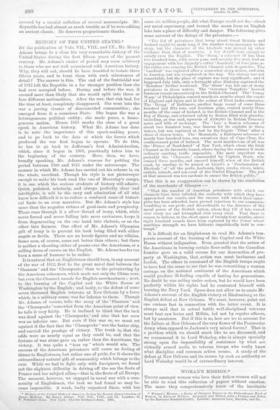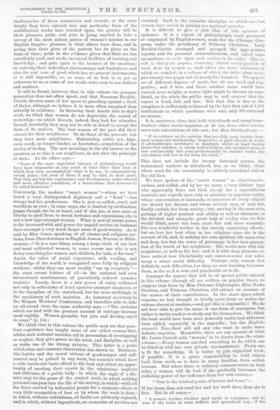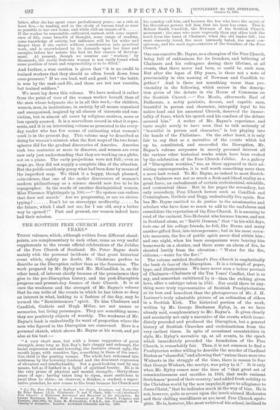WOMAN'S MISSION.* Tnosn amongst women who love their fellow-women will
not be able to read this collection of papers without emotion. The more they comprehensively know of the inevitable Iiraman'c Miesion : e Series of Co, gram Armenian the Philanthropic Work of Women, ley Eminent Writerx, Arrangod LOUt Edited, with a Prafaco and Note, by the 13aroness Burdott•Couttc. London StunIton Low, Marston, and Co. inadequacies of these summaries and records, or the more deeply they have entered into any particular form of the multifarious works here touched upon, the greater will be their pleasure, pride, and pain in being enabled to take a survey of the most salient points of woman's mission in our English Empire : pleasure in what others have done, and in seeing that their piece of the pattern has its place on the loom of time ; pride in the evidence given that their sex has unselfishly used, and needs, increased facilities of training and knowledge ; and pain (pain is the keenest of the emotions) in realising their individual shortcomings and limitations, and also the vast sum of good which has no present instruments, or is still impossible, or, as sonic of us feel, is as yet as unknown to us as some of our works were even to our fathers and mothers.
It will be found, however, that in this volume the younger generation does not often speak, and that Baroness Burdett- Coutts devotes some of her space to guarding against a fault of theirs, although we believe it is more often imagined than actually in existence. In throwing their hearts into to-day's work, we think that women do not depreciate the record of yesterday,—to which history, indeed, they look for stimulus, though inevitably they may not be able in detail to accept the dicta of its makers. The best women of the past did their utmost for their neighbours. So do those of the present; but they have more neighbours. Nationality, order, sex, type, even creed, no longer hinder, as heretofore, completion of the circles of to-day. The new meanings in the old answer to the question as to who is our neighbour, do not alter the principle at stake. As the editor says,— "Some of the more important labours of philanthropy would have been impossible at any point of time other than that at which they were accomplished—that is to say, in comparatively recent years ; but even of these it may be said, in most cases, that they are but the continuance and development, under altered and more effective 'conditions, of a benevolence that deserves to be called historical."
Conversely, the modern "smart woman "—whom we have heard a very distinguished dignitary call a "fiend "—has always had her predecessor. She is just as selfish, cruel, and worthless as ever ; in some ways, she is limited by civilisation, pagan though she be at heart, and if she, too, is now more at liberty to spoil lives, to wreck fortunes and reputations, she is not a new type amongst women. What is new of recent years, is the increased wish and power for unpaid service on business lines amongst a very much larger mass of good women. As is said by Miss Janes, speaking of all classes and religious sec- tions, from Churchwoman to English Jewess, Peeress to Bible- woman,—" It is a rare thing, among a large circle of our best and most cultivated women, to come across one who is not doing something for women and children, for lads, or for men." Again, the value of social experience, wide reading, and knowledge of the world, is recognised more fully by religious workers ; whilst they can more readily "use up everybody "— the most recent feature of all—in the national and even intercolonial combinations of parochially ordered monster societies. Lastly, there is a new power of unity evidenced not only in collections of local agencies amongst amateurs, or in the discipline of the sisterhood, but far more strikingly in the machinery of such societies. As honorary secretary to the Women Workers' Conference, and therefore able to take an all-round view, the same authority says :—" The societies which are tied with the greatest amount of red-tape increase most rapidly. Women grumble, but join and develop esprit de corps." (p. 144.) We think that in this volume the public may see that prac- tical experience has taught some of our ablest women that, whilst such national societies aid in prevention of overlapping or neglect, they give power to the weak, and discipline as well as make use of the strong natures. This latter is a point which close and constant observation has shown us. Business- like habits and the moral virtues of good-temper and self- control may be gained in any work, but societies which have a wide territorial basis afford to the best and ablest an oppor- tunity of meeting their equals in the wholesome neglects and oblivious of a public body : in which the eagle of a dis- trict may be the goose of the central work, in which nothing personal can pass into the life of the society, in which—with all the force exerted by influential people for a moment—there is very little recognition of how or by whom the work is done : in which, without unkindness, all faults are pitilessly exposed, and in which, without ingratitude, no memories of services are retained. Such is the valuable discipline to which our best women have access in joining our national societies.
It is difficult to give a just idea of this epitome of epitomes. It is a report of philanthropic work promoted or originated by Englishwomen, made for the Chicago Con- gress, under the presidency of Princess Christian. Lady Burdett-Coutts arranged and grouped the type-written reports and the personal communications, and asked some sympathiser to write upon each section in its order. The re- sult is thirty-six papers, reviewing almost every portion of work done by women as such (there are some omissions at which we wonder), in a volume of which the index alone occu- pies twenty-two pages out of nearly five hundred. The papers are of different degrees of merit, but all are lucid and sug- gestive ; and if here and there another name would have carried more weight, or newer light might be thrown on some detail, on the whole the public may be well content that the report is fresh, full, and fair. But that this is due to the compilers is sufficiently evidenced by the fact that out of 1,164 institutions to which questions were sent, only 390 returned an answer.
It is, moreover, clear that both sisterhoods and many home- workers either resent inquiries, or do not, from other causes, enter into calculations of this sort; but Miss Hubbard says :— " If we venture on the opinion that possibly sonic twenty thou- sand women are maintaining themselves as paid officials in works of philanthropic usefulness in England, whilst at least twenty times that number, or about half-a-million, are occupied more or less continuously and semi-professionally in similar• works, the calculation will not be far from the truth."
This does not include the twenty thousand nurses, the maintained workers in sisterhood, nor, as we think, those whose work for the community is entirely occasional and on the old lines.
We have spoken of the "smart woman" as objectionable, useless, and selfish, and by her we mean a very distinct type who apparently fears not God, except for a superstitious moment, and regards man only as minister to supreme vanity, whose conversation is innuendo, or narrative of every subject she should not discuss, and whose actions may, or may not, finally exclude her from society ; but, moving in the same sets, perhaps of higher position and ability as well as character, is the devoted and energetic great lady of to-day who, we fain would think, never has been more fair and more womanly. She is a wonderful worker in her merely organising efforts ; but we love her best when in her religious aims she is the servant of all, and, in making her own spiritual life more true and deep, has lost the sense of patronage in her true percep- tion of the worth of her neighbour. She works now with her neighbour, as well as for her; and it is with deep pleasure we have noticed how Christianity and common-sense can solve many a minor social difficulty. Perhaps only women feel definitely such difficulties, but they are now learning to ignore them, as far as it is wise and practicable so to do.
Amongst the papers that will be of special public interest in this volume (though all are, written on popular lines), we suppose that those by Miss Florence Nightingale, Miss Hesba. Stretton, and Princess Christian, will attract on account of the names of their contributors. In the short space which remains, we had thought to briefly quote from or notice the volume almost at random,—and yet this is impossible I We do not here wish to give the name of one form of enterprise, but rather to invite readers to study any for themselves. We think the book would have been more generally useful had addresses been added, especially in the appendix ; but the EngZish- woman's Year-Book will aid any who want to make more definite inquiries. Meanwhile, there are any amount of what Mr. Lewis Carroll calls "morals," to be drawn from the whole volume :—Every woman can find something to do, which can be fitted in with her own private circumstances. Every one is fit for something. It is better to join organised work, if possible. It is a grave responsibility to hold others back from work, as is done in many families, from selfish reasons. But where there is ordinary common-sense on both sides, a woman will do best if she gradually increases the radiating power of her influence from her own centre,— "True to the kindred points of heaven and home."— If her home does not need her and her work does, then she is free. But in all cases,— " A woman worker, whether paid agent or volunteer, will be wise if she train in some definite and specialised 'way ; if the
latter, after she has spent some probationary years,—as a rule at least five,—in reading and in the study of human kind as near as possible to her own home, and while still an inmate of it If the worker be reasonable, cultivated, earnest, with some experi- ence of life, some breadth of thought, some range of reading, some knowledge of society, her influence will be far wider and deeper than if she rushes without consideration into practical work, and is overwhelmed by its demands upon her time and energies before her nature has had its fair chance of develop- ment. At present, though we number our ' workers by thousands, the really first-rate woman is not easily found when some position of trust and responsibility is to be filled."
And further, a wise caution is given that "it is no credit to trained workers that they should so often break down from over-pressure!' If we can lead, well and good; but " the battle is won by the rank-and-file, and these are not raw recruits, but trained soldiers."
We must lay down this volume. We have noticed it rather from the point of view of the woman worker herself, than of the man whose helpmate she is in all this work,—for children, women, men, in institutions, in society, by all means organised and unorganised, inspired by all classes of interests and con- viction, but in almost all cases by religious motives, more or less openly avowed. It is a marvellous record in what it repre- sents, and it is an interesting volume as presented to the every- day reader who has few means of estimating what woman's work is in the present day. This volume may be described as doing for woman's mission what the first maps of the two hemi- spheres did for the gradual discoveries of America. America took two centuries or more to discover, and women are even now only just understanding that they are working on a globe, not on a plane. The early projections were not full; even as maps go, they did not supply a complete idea of the situation. But the public could only grasp what had been done by means of the imperfect map. We think it a happy, though planned, coincidence, that one of the earlier discoverers of woman's modern philanthropy as a science should now live to be its topographer. In the words of another distinguished woman,
Miss Florence Nightingale (p. 196) :—" No system can endure that does not march.' Are we progressing, or are we stereo-
typing ? Don't let us stereotype mediocrity In the future, which I shall not see, for I am old, may a better way be opened I" Past and present, our women indeed have had their mission.




















































 Previous page
Previous page